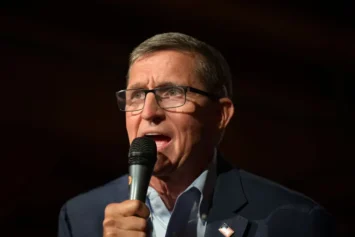
Former KTVA reporter and legal pot proponent Charlo Greene.
Two years ago, former Anchorage, Alaska TV reporter Charlo Greene went out with a bang when she concluded her segment on marijuana with the surprising revelation that she herself was the proud owner of a pot dispensary and staunch advocate for legalization.
“… I’ll be dedicating all of my energy toward fighting for freedom and fairness, which begins with legalizing marijuana here in Alaska,” Greene said. “As for this job … f–– it. I quit.”
Her on-air resignation shocked viewers and fellow KTVA news reporters alike. But the stunt also rocketed her to fame among marijuana advocates pushing for legalization of the drug.
When Alaska became the third state in the U.S. to legalize recreational use of marijuana in November 2014, Greene quickly became a full-time pot proponent, helping Alaskans get their hands on the highly coveted “Mary Jane.” But despite the state’s legalization of the drug, Greene had trouble establishing a legitimate marijuana business.
According to The Guardian, the state of Alaska launched a series of undercover operations and raids at her dispensary, known as the Alaska Cannabis Club. Greene, 28, was initially charged with eight criminal counts of “misconduct involving a controlled substance.”
It was later revealed that the case against Greene included six additional offenses than originally stated in her indictment, a spokesperson from the Alaska attorney general’s office confirmed with the publication. The former news reporter now faces 14 criminal offenses and a possible 54 years behind bars.
“It’s almost dizzying when you try to make sense of it,” Greene, whose legal name is Charlena Egbe, said of her upcoming trial in an interview with The Guardian. “It could literally cost me the rest of my adult life.”
The indictment — which Greene likened to a “modern day lynching” — brings new attention to the war on drugs and discriminatory policing where African-Americans and Latinos are disproportionately targeted for minor marijuana-related offenses. For instance, data collected by the American Civil Liberties Union found that Blacks were 3.73 times more likely to be arrested for marijuana, even though Blacks and whites use the drug at about the same rate. This statistic also holds true in states where marijuana has been legalized.
Black Americans have also been systematically shut out of the marijuana boom. According to Buzzfeed, all the states that have legalized pot for medicinal or recreational use prohibit anyone with drug charges from working in the marijuana industry. So Black people convicted on drug charges in the past are essentially barred from profiting in an industry that’s now legal.
Alaska’s 2014 measure for the legal manufacture, sale and possession of marijuana finally took effect in February 2015. However, the state stopped short of finalizing regulations for marijuana retail operations, The Guardian reports. That’s when detectives targeted Greene’s Alaska Cannabis Club, as she allowed customers to purchase drugs and club memberships in exchange for donations.
Records show detectives executed six undercover purchases and two raids over a five-month period, according to the publication.
“The fact that they were watching us for so long, I kind of felt violated,” said Jennifer Egbe, Greene’s 26-year-old sister, who worked at the dispensary. “I was really just heartbroken. I never assumed it would go this far.”
Per court documents, Greene was never involved in any of the undercover transactions, but authorities still moved to charge her because the business was in her name.
She has since pleaded not guilty and is expected to go on trial in the coming months.


